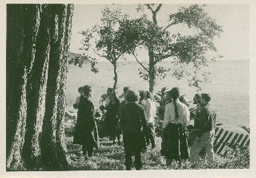—Marion Goldman

An op-ed piece in the August 31st New York Times (“What the Chair Could Have Told Clint”) explained Clint Eastwood’s imaginary dialogue at the Republican National Convention as a form of a psychodrama technique that was developed by psychiatrist Jacob Moreno over a century ago. In the sixties and seventies, conversations with an empty chair were incorporated into Gestalt and humanistic psychology workshops at Esalen Institute, a retreat and personal growth mecca on the central California Coast, which has several connections to Eastwood.
Esalen, the subject of my book, The American Soul Rush, is located about 25 miles south of Eastwood’s luxurious Tehama Golf Club. And both golf and proximity tie the movie star, Esalen, and the Institute’s diverse practices for personal and spiritual expansion together.
Michael Murphy, one of the Institute’s two founders, wrote Golf in the Kingdom, a fantasy novel that Eastwood loved and hoped to make into a movie. The book promises golfers that the perfect swing is inside them, just as humanistic psychology promises everyone that a perfect life awaits within. To reach that ideal swing (or life), you must confront and rid yourself of old emotional patterns that stand in the way of your self-actualization.

That’s where the chair comes in. In therapeutic and educational settings at Esalen, guided conversations with an imaginary person or symbolic object facilitate expression of suppressed emotions that can impede present happiness. In my research for The American Soul Rush, I participated in a workshop where members talked with symbols of money, power, sex, time, and death that rested on different chairs. This exercise and and six others designed to facilitate personal and spiritual growth are offered in the book’s Appendix. Before incorporating any of these, I test drove them myself and also with various classes of about 40 students. The chair work amazed all of us and effectively demonstrated the ways that the Human Potential Movement and Esalen can take people beyond words.
The beliefs and practices that the Institute popularized have seeped into America’s culture of individualism—a culture that Clint Eastwood so effortlessly, and publicly, personifies.
Marion Goldman is Professor of Sociology and Religious Studies at the University of Oregon, and author of The American Soul Rush: Esalen and the Rise of Spiritual Privilege.
